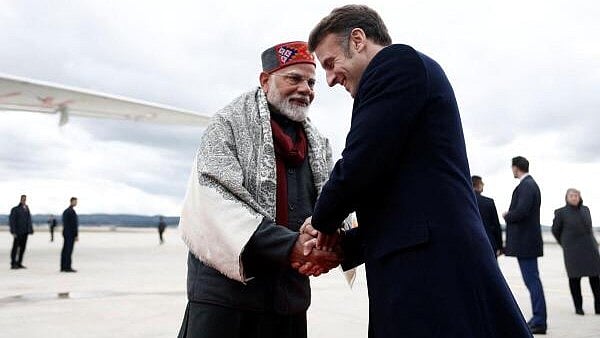
French President Emmanuel Macron shakes hands with Indian Prime Minister Narendra Modi after a departure ceremony at Marseille Provence airport in Marignane as part of a visit in Marseille, France, February 12, 2025.
Reuters
New Delhi: Prime Minister Narendra Modi and President Emmanuel Macron on Wednesday announced a new partnership for building modular nuclear reactors, even as the two sides signalled progress in negotiations for the construction of three additional Scorpène-class ‘Hunter-Killer’ submarines for the Indian Navy by Mazagon Dock Shipbuilders Limited and Naval Group of France.
New Delhi also offered France the Pinaka Multi-Barrel Rocket Launcher developed by Defence Research and Development Organisation (DRDO) of India.
Modi concluded his visit to Paris and Marseille and left for Washington DC after he and Macron announced a new partnership on Small Modular Reactors (SMRs) and Advanced Modular Reactors (AMRs) in a bid to add momentum to bilateral civil nuclear cooperation, which so far centred around the proposed Jaitapur Nuclear Power Plant to be built in Maharashtra in India by Électricité de France SA. The two leaders also agreed on a roadmap for India-France cooperation on Artificial Intelligence.
They, however, refrained from making a formal announcement on the much-expected deal worth over Rs 63,000 crore for the procurement of 26 Rafale Marine fighter jets from Dassault Aviation of France for the INS Vikramaditya and INS Vikrant, the two aircraft carriers of the Indian Navy.
The leaders commended progress in collaboration in the construction of Scorpène submarines in India, including indigenization, and, in particular, the work carried out with a view to the integration of the DRDO-developed Air Independent Propulsion (AIP) into P75-Scorpène submarines and the analyses conducted regarding the possible integration of the Integrated Combat System (ICS) into the future P75-AS submarines, according to a joint statement issued after the Modi-Macron bilateral meeting on the sideline of the AI Action Summit, which the two leaders co-chaired in Paris.
The P75 or Project 75 is an acquisition programme launched by New Delhi for the construction of six Kalvari-class – an export derivative of the Scorpène-class of France – diesel-electric submarines for the Indian Navy. The two sides have been negotiating a Rs 36,000 crore deal for the construction of three additional submarines under the P75-AS programme. The AIPs developed by DRDO would help the future P75 submarines to stay underwater for a longer duration.
The deals on Rafale Marine jets and for the additional P75 submarines could be formally announced when Modi would play host to Macron within the next few months, a source in New Delhi said.
The two sides issued a joint declaration of intent for triangular cooperation in the Indo-Pacific, along with the governments of the beneficiary nations in the region. France has substantial geopolitical interests in the western Indian Ocean and southern Pacific, with a large number of its military personnel deployed in the region.
The French Government has territorial control over the Réunion and Mayotte islands in the Indian Ocean and New Caledonia and French Polynesia in the Pacific. While over 60% of France’s Exclusive Economic Zone is in the Pacific, over 20% is in the Indian Ocean. Djibouti on the Horn of Africa has a base of the French Army. France, however, stayed away from the Quad – a coalition forged by India, Japan, Australia and the United States to counter China’s expansionist aspirations in the Indo-Pacific region.
“We've been discussing, for instance, cooperation in the Jaitapur Nuclear Power Project for some time. That, of course, is a very large project. It has multiple aspects related to technology, finance, and also to issues related to civil liability,” Foreign Secretary Vikram Misri said while briefing journalists about the outcomes of the Modi-Macron bilateral meeting.
He noted that India and France were keen to move fast on co-designing, co-developing and co-producing the SMRs and AMRs as such reactors were based on technologies which were still in initial stages even in countries where works on them had been going on for quite some time. He also linked it with the emergence of Artificial Intelligence – an emerging technology that would demand huge amounts of electricity.
“The amount of electricity that will be needed (for AI), if it is going to be sustainable, then it has to be something like nuclear power-driven electricity. And that is the area in which (the) SMRs and AMRs can play a key role. And that's what this letter of intent (between India and France) sets out to do,” said the foreign secretary.
